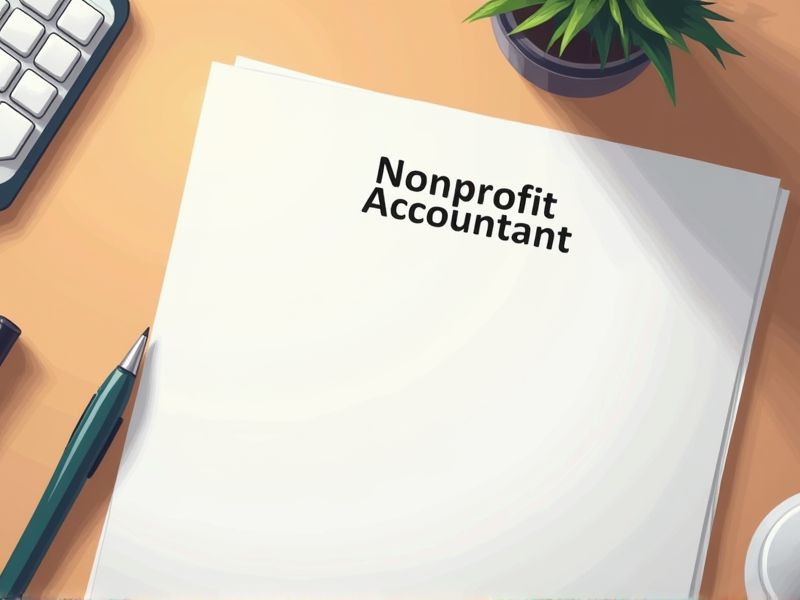
Nonprofit accountants handle unique financial challenges that require specialized skills and knowledge. Certifications such as CPA, CMA, or CNAP ensure accountants have the expertise to navigate nonprofit financial regulations and reporting requirements effectively. These credentials validate proficiency in managing donor funds, grants, and diverse revenue sources unique to nonprofit organizations. Here are some key certifications essential for a career as a nonprofit accountant.
Certified Public Accountant (CPA)
Nonprofit organizations deal with complex accounting issues that require a CPA's expertise to ensure accurate financial reporting. The presence of a CPA helps enhance transparency and accountability, which is essential for maintaining donor trust and meeting regulatory requirements. A CPA's knowledge of tax laws and compliance is crucial in assisting nonprofits to maintain their tax-exempt status. Their analytical skills aid in strategic financial planning, enabling nonprofits to better allocate resources and achieve their missions more efficiently.
Certified Management Accountant (CMA)
Nonprofit organizations often rely on Certified Management Accountants (CMAs) to ensure precise financial management, which directly impacts their ability to allocate resources effectively for their missions. The specialized skills CMAs bring in budgeting and financial analysis enhance transparency, promoting donor confidence and trust. Compliance and regulatory changes frequently affect nonprofits, and CMAs help navigate these complexities to avoid legal pitfalls. In environments where funding is often limited, CMAs facilitate strategic financial planning, enhancing overall organizational sustainability.
Certified Government Financial Manager (CGFM)
The Certified Government Financial Manager (CGFM) credential enhances a nonprofit accountant's knowledge of government financial processes, which is crucial for organizations receiving federal or state funding. Mastery of government accounting standards gained through CGFM certification ensures compliance with complex reporting requirements and reduces the risk of financial mismanagement. The CGFM certification equips accountants with strategic fiscal management skills, improving financial stewardship and organizational decision-making. As nonprofits increasingly intersect with government activities, having CGFM-certified accountants provides credibility and trustworthiness in financial reporting and accountability.
Certified Internal Auditor (CIA)
A Certified Internal Auditor provides assurance that a nonprofit's financial practices adhere to industry standards and regulatory requirements, thus safeguarding against financial mismanagement. Their expertise can significantly enhance the accuracy and reliability of financial reporting, which is essential for maintaining donor trust and securing funding. Having a CIA on board enables the organization to identify operational inefficiencies, leading to improved allocation of resources. In the context of stringent compliance environments, the auditor's insight is pivotal in avoiding legal repercussions and sustaining the nonprofit's mission.
Certified Fraud Examiner (CFE)
Certified Fraud Examiners (CFEs) bring specialized knowledge in fraud detection and prevention, crucial for safeguarding nonprofit organizations' assets, which often rely heavily on donor contributions. Nonprofits are vulnerable to fraud due to limited internal controls and resources, so CFEs help design and implement effective anti-fraud strategies. The CFE's expertise in financial analysis and investigative skills aids in identifying anomalies and potential fraud, ensuring financial integrity. Their role in maintaining transparency and accountability enhances donor trust and supports the long-term sustainability of the nonprofit.
Certified Nonprofit Accounting Professional (CNAP)
Nonprofit organizations often face unique financial reporting and compliance requirements that differ from for-profit entities. Obtaining a Certified Nonprofit Accounting Professional (CNAP) designation equips accountants with specialized knowledge to handle sector-specific challenges in accounting practices. This certification ensures accountants can effectively navigate the complexities of fund accounting, grant management, and regulatory compliance. With a CNAP, nonprofit accountants enhance their credibility and can better maintain the financial integrity essential for organizational trust and donor confidence.
Certificate in Nonprofit Accounting and Finance (CNAF)
The Certificate in Nonprofit Accounting and Finance (CNAF) equips nonprofit accountants with specialized skills unique to the sector, addressing regulatory and financial nuances absent in general accounting programs. This certification enhances an accountant's ability to efficiently manage funds within the confines of nonprofit-specific tax and reporting requirements. As nonprofits often face tighter budget constraints, possessing CNAF ensures the accuracy and integrity of financial information, crucial for maintaining donor trust. The certification provides a competitive edge in the job market, indicating a deep understanding of sector-specific financial challenges and solutions.
Certified Nonprofit Professional (CNP)
A Certified Nonprofit Professional (CNP) enhances a nonprofit accountant's understanding of the unique financial challenges faced by nonprofit organizations, allowing them to navigate regulations more effectively. A CNP credential equips accountants with specialized knowledge in nonprofit accounting standards, improving accuracy in financial reporting. This certification aids in aligning financial practices with the organization's mission, ensuring funds are utilized correctly. The network and resources provided by CNP certification offer continuous professional development, keeping accountants informed about the latest trends and strategies in the nonprofit sector.
Certified Fundraising Executive (CFRE)
Certified Fundraising Executive (CFRE) designation enhances a nonprofit accountant's credibility, often leading to increased trust from stakeholders and donors. This credential provides an accountant with structured methodologies and ethical standards in fundraising, which streamlines financial reporting and management. The CFRE program emphasizes strategic planning and evaluation, which aligns closely with non-profit accounting responsibilities, improving overall efficiency. Possessing a CFRE title can lead to better career advancement opportunities, as it denotes specialized expertise in the intersection of fundraising and financial oversight.
Chartered Global Management Accountant (CGMA)
Nonprofit organizations often face complex financial challenges that require advanced management strategies; CGMA designation equips accountants with skills in strategic planning and financial management. Through the CGMA program, accountants gain expertise in risk management, enabling nonprofits to navigate financial uncertainties effectively. Nonprofit accountants benefit from CGMA's focus on ethical financial leadership, essential for maintaining trust and accountability. CGMA training enhances decision-making capabilities, ensuring resources are allocated efficiently to fulfill the nonprofit's mission.
Summary
By obtaining certifications, you can enhance your skills and increase your credibility in the nonprofit sector. Certification may lead to better career opportunities and can potentially boost your earning potential. Employers might view certified accountants as more knowledgeable and reliable, which could result in a competitive advantage. The process of certification could also expand your professional network, providing valuable connections in the industry.
